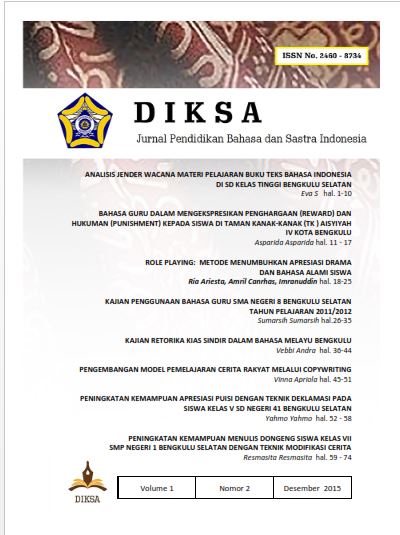Main Article Content
Abstract
This research aims to describe (1) function of "maternal uncle" for his nephew (2) prohibition for the same tribe marriage (3) the function of maternal uncles for people in one tribe including in Novel "Mencari cinta yang Hilang" by Abdulkarim Khiaratullah. This research was qualitative research that used descriptive methode which had characteristic was conten analysis, that is a research which have done by examining a literature manuscript by looking at a piece of fact or dialog from the figure that purpose to knowing the element of minangkabau culture that including in novel. Technique of gathering data in this research use documentation technique and writing a note technique. Analysis result show that, first, in overal 'maternal uncle' describing in this novel is responsive and guiding his nephew, its according to rules, which 'maternal uncle' in Minangkabau People is very important to his nephew life. Only 'maternal uncle' from Rahima, Mak Katik which did not a right job. Second, problem about forbidding one tribe marriage is still a trouble on Minangkabau people life, that is reflected in novel that still find a polemic about forbidding one tribe wedding, tradition agreement which very compoting with one tribe marriage whom judging as marriage with own family, in other hand based on religion one tribe marriage is not forbidden thing. Third, this novel also reflect a figure of 'Niniak Mamak' in minangkabau people, there is finish tradition clash, in this novel 'niniak mamak' also finish a problem of one tribe marriage, which is Chaniago clan, on discussion which leading by Datuk Rangkayo Sati as people leader has a decision which a one tribe marriage between Fauzi and Rahima can not continued.
Keywords
Article Details
Authors who publish with this journal agree to the following terms:
- Authors retain copyright and grant the journal right of first publication with the work simultaneously licensed under a Creative Commons Attribution License that allows others to share the work with an acknowledgment of the work's authorship and initial publication in this journal.
- Authors are able to enter into separate, additional contractual arrangements for the non-exclusive distribution of the journal's published version of the work (e.g., post it to an institutional repository or publish it in a book), with an acknowledgment of its initial publication in this journal.
- Authors are permitted and encouraged to post their work online (e.g., in institutional repositories or on their website) prior to and during the submission process, as it can lead to productive exchanges, as well as earlier and greater citation of published work (See The Effect of Open Access).
References
- Damono, Sapardi Djoko. 1984. Sosiologi Sastra Sebuah Pengantar Ringkas. Jakarta: Pusat Pembinaan dan Pengembangan Bahasa.
- Endaswara, Suwardi. 2011. Metodelogi Penelitian Sosiologi Sastra. Yogyakarta: CAPS.
- Koentjaraningrat. 1992. Beberapa Pokok Antropologi Sosial. Jakarta: Dian Rakyat.
- Koentjaraningrat. 1990. Pengantar Ilmu Antropologi. Jakarta: Rineke Cipta.
- Koentjaraningrat. 2004. Kebudayaan Mentalitas dan Pembangunan. Jakarta: Gramedia.
- Ratna, Nyoman Kutha. 2011. Antropologi Sastra Peranan Unsur-unsur Kebudayaan dalam Proses Kreatif. Yogyakarta: Pustaka Pelajar.
- Semi, M. Atar. 1988. Anatomi Sastra. Padang: Angkasa Raya.
- Semi, M. Atar. 1993. Metode Penelitian Sastra. Bandung: Angkasa.
- Muhammad. 2011. Metode Penelitian Bahasa. Jogjakarta: Ar-Ruzz Media.
- Moleong, Lexy. 2010. Metodologi Penelitian Kualitatif. Bandung: Rosda.
- Navis, AA. 1986. Alam Takambang Jadi Guru. Jakarta: Grafini Press.
References
Damono, Sapardi Djoko. 1984. Sosiologi Sastra Sebuah Pengantar Ringkas. Jakarta: Pusat Pembinaan dan Pengembangan Bahasa.
Endaswara, Suwardi. 2011. Metodelogi Penelitian Sosiologi Sastra. Yogyakarta: CAPS.
Koentjaraningrat. 1992. Beberapa Pokok Antropologi Sosial. Jakarta: Dian Rakyat.
Koentjaraningrat. 1990. Pengantar Ilmu Antropologi. Jakarta: Rineke Cipta.
Koentjaraningrat. 2004. Kebudayaan Mentalitas dan Pembangunan. Jakarta: Gramedia.
Ratna, Nyoman Kutha. 2011. Antropologi Sastra Peranan Unsur-unsur Kebudayaan dalam Proses Kreatif. Yogyakarta: Pustaka Pelajar.
Semi, M. Atar. 1988. Anatomi Sastra. Padang: Angkasa Raya.
Semi, M. Atar. 1993. Metode Penelitian Sastra. Bandung: Angkasa.
Muhammad. 2011. Metode Penelitian Bahasa. Jogjakarta: Ar-Ruzz Media.
Moleong, Lexy. 2010. Metodologi Penelitian Kualitatif. Bandung: Rosda.
Navis, AA. 1986. Alam Takambang Jadi Guru. Jakarta: Grafini Press.
